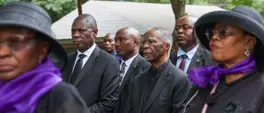Ramaphosa expected to sign BELA Bill into law
Alpha Ramushwana and Lindsay Dentlinger
13 September 2024 | 4:01Ramaphosa will formalise the bill during a public ceremony at the Union Buildings on Friday morning, despite concerns raised.
JOHANNESBURG - President Cyril Ramaphosa is expected to sign the Basic Education Laws Amendment (BELA) Bill into law on Friday morning.
Ramaphosa will formalise the bill during a public ceremony at the Union Buildings. This despite concerns raised by the Democratic Alliance (DA) and by its minister in the basic education portfolio, Siviwe Gwarube.
The legislation, which has sparked controversy, aims to strengthen governance in the education sector and make Grade R compulsory, among other provisions.
ALSO READ:
- EXPLAINER: BELA Bill gets thumbs up in Parliament - but what is it all about?
- DA’s Steenhuisen says not every policy conflict means the GNU will fail
This decision comes despite substantial opposition from various parties both within and outside the Government of National Unity (GNU).
African National Congress (ANC) Secretary General Fikile Mbalula voiced the party’s support for the president’s move to enact the bill.
“From the reports that we got, which are very inspirational, is that on Friday, Matamela looks like he’s ready to sign. So, we look forward to Friday, and signing will be good news all round for the majority in this country.”
DA WITHIN RIGHTS TO APPROACH COURT
Ramaphosa said the DA was within its rights to approach the court over its unhappiness with the bill.
DA leader John Steenhuisen said the party would not be a pushover in the GNU, and had real concerns about the impact of mother tongue instruction if the bill in its current form became law.
Steenhuisen addressed the Cape Town Press Club about his party’s next steps on the contentious bill.
Along with the National Health Insurance (NHI) Act, which became law before the May polls, they’ve been sticking points for some parties in the GNU.
“It is my sincerest hope the bill won’t be signed, but if it is, we will do what we need to do and take it to court, and put our money where our principles are in terms of challenging it. And that is okay. It is okay to differ.”
On the other side of town, the president was addressing journalists on the steps of Parliament, saying he was unaware of the DA’s threat to mount a legal challenge.
“Courts are the final arbiter in our country, so anybody, at any time, is enabled and empowered to go to any court to have what they perceive as a dispute to be arbitrated upon.”
Steenhuisen said similarly the DA would also go to court on the NHI Act if necessary, but for now, it was trying to find a common way forward.
Trending News
More in Politics

20 December 2025 06:26
SADTU sounds alarm: Rising student violence driving teachers out of the profession

20 December 2025 06:07
‘South Africa is in serious problems’: Thabo Mbeki pays tribute to late advisor Titus Mafolo

19 December 2025 15:16
EFF condemns US sanctions on ICC judges as a brazen attack on global justice











